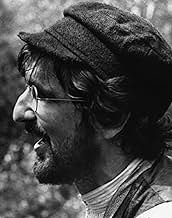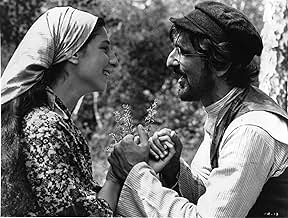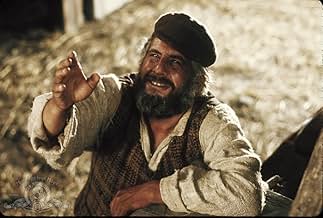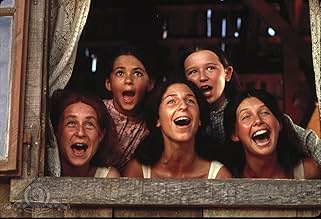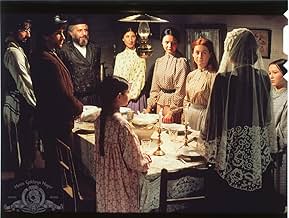En la Rusia prerrevolucionaria, un campesino judío piensa sobre si casar a tres de sus hijas mientras el creciente sentimiento antisemita amenaza su pueblo.En la Rusia prerrevolucionaria, un campesino judío piensa sobre si casar a tres de sus hijas mientras el creciente sentimiento antisemita amenaza su pueblo.En la Rusia prerrevolucionaria, un campesino judío piensa sobre si casar a tres de sus hijas mientras el creciente sentimiento antisemita amenaza su pueblo.
- Dirección
- Guionistas
- Elenco
- Ganó 3 premios Óscar
- 10 premios ganados y 14 nominaciones en total
Paul Michael Glaser
- Perchik
- (as Michael Glaser)
Ray Lovelock
- Fyedka
- (as Raymond Lovelock)
Opiniones destacadas
10Spleen
The range and audacity of `Fiddler on the Roof' is stunning. By comparison today's musicals are timid, quaking things, terrified of frightening their audiences away however much `social relevance' bravado they may assume. This old musical is older than it looks. The film dates from 1971; the musical itself from 1963; but even then it was clear that it was the last of its kind, a delayed swan-song from the 1950s. There's sentiment, but no promise of a happy ending; humour, but not a trace of postmodern knowingness; realism, but and a willingness to indulge in fantasy, too. Musicals can't really survive without fantasy, and `Fiddler', along with `West Side Story', may very well mark the limit of just how serious it is possible to get without losing it. The songs are uniformly good. I don't know if Bock's music was usually so fitting, or if he happened to strike gold just once - not that it matters.
As for the film ... I only wish I'll get a chance to see it in a cinema, for the photography is beautiful - and it IS the photography that's doing it, since we're made to realise that neither the village nor its setting is picturesque in itself. Norman Jewison has assembled a cast not one member of which jars and makes the most of it. This film is quite long, and feels longer, but neither length nor apparent length is a liability.
As for the film ... I only wish I'll get a chance to see it in a cinema, for the photography is beautiful - and it IS the photography that's doing it, since we're made to realise that neither the village nor its setting is picturesque in itself. Norman Jewison has assembled a cast not one member of which jars and makes the most of it. This film is quite long, and feels longer, but neither length nor apparent length is a liability.
Let me say up front, I am not predisposed to enjoy a movie like this. On the contrary, as a straight WASP, the last thing I want to watch is a broadway musical or a bunch of Jews 'kavetching' about how bad they have it. That is definitely NOT what this film is about. Though the subject matter is Jewish, to say it is a Jewish film would grossly limit it's significance. It is about the human experience. Any one who has felt pain and persecution will relate to it. Therefore I say every human should love this film. It has an indomitable optimism and remarkable pathos that causes the viewer to empathize with the characters, namely Reb Tevye, played by Topol in arguably one of the finest dramatic performances ever. Considering the lack of success Topol has had with the rest of his career it would literally seem he was born to play this part. This film will most likely not be enjoyable for those looking for spoon fed, mindless entertainment or titillation, but for anyone who appreciates the beautiful things in life, it is high art. I recommend you set aside an undisturbed block of time, (use the can first, it's three hours long) when you are feeling relaxed, eat some good homemade soup and watch this masterpiece. Perfect casting, cinematography, pacing, art direction, wardrobe and best of all, an exquisite soundtrack by the great, and very young, John Williams. Listen to this movie on a powerful sound system and it will sweep you into each musical number. Especially (my favorite) the bar room dance scene. Fiddler on the Roof should be on every top 100 list that exists. Like no other movie I can think of, 'Fiddler' reaches deep into the heart and begs one to look at what things in life are worth living for and dying for.
I know people have complained about the length of this movie. Yeah, it is long, three hours approximately, but there are so many things that compensate. Norman Jewison's direction is very good, and the film is stylishly filmed, with some nice cinematography and there are nice scenery and costumes. The choreography is great, energetic in parts and graceful in others. Next, the music is outstanding. The incidental music largely reminiscent of Russian folk music is a real treat, but the songs are outstanding. The beautiful "Sunrise, Sunset", the fun "Tradition", the idealistic "Match Maker" and the energetic "If I Were A Rich Man", all amazing. Also, Topol, what an absolutely brilliant performance. He put body and soul into Tevye, successfully mixing humour, wisdom and poignancy and the result is one of the most memorable performances in any musical to grace our screens. All the other performances are wonderful, I liked it all five daughters had distinct personalities, and Norma Crane is fantastic as the mother. The story is both tight and poignant, about a milkman of Jewish values, who wishes his five daughters to marry. In conclusion, wonderful and definitely memorable. 10/10 Bethany Cox
In pre-revolutionary Russia, a poor Jewish peasant (Topol) must contend with marrying off his three daughters while antisemitic sentiment threatens his home.
Let me say this right of the bat: while this film may focus on a Jewish family and their struggle to enter the modern world (which may be good or bad), you certainly do not need to be Jewish to enjoy it. I always felt like this film (and "Yentl") were marketed towards the Jewish community, but it need not be. It is just a great story with excellent songs.
I loved the singing, the dancing, the story, the humor, the characters... there was really nothing I disliked about it. I was a bit surprised the eldest daughter was not Barbra Streisand, because they look identical. But, oh well. And I am also a bit surprised that the director was not Jewish, especially with a name like Jewison... but hey, he did a marvelous job!
Let me say this right of the bat: while this film may focus on a Jewish family and their struggle to enter the modern world (which may be good or bad), you certainly do not need to be Jewish to enjoy it. I always felt like this film (and "Yentl") were marketed towards the Jewish community, but it need not be. It is just a great story with excellent songs.
I loved the singing, the dancing, the story, the humor, the characters... there was really nothing I disliked about it. I was a bit surprised the eldest daughter was not Barbra Streisand, because they look identical. But, oh well. And I am also a bit surprised that the director was not Jewish, especially with a name like Jewison... but hey, he did a marvelous job!
The story took place in the village of Russia, 1904. It centered around the leading role, Tevya, who was diaryman. Tevya was a enlightened old man, he had open-minded thought and he deeply loved his three daughters. When he looked into the future of the daughters who were unmarried, he always sang the song "If I am the rich" very kindly, because he fervently expected that they got a bright future.
In the beginning, Tevya was trying to marry off Tzietel, the oldest daughter. The matchmaker found her a matcher in Lazar Wolfm the butcher. However, the butcher was much older than Tzietel, and she didn't love him. she loved a poor tailor, and they promised to each other that they would get married. At last Tevya said yes to them. Meanwhile the second child Hodel, and a poor student also fell in love soon, and they got engaged. They informed her father this and he gave them permission to be married. The poor student was arrested for demonstrating, and was sent to a distant prison, Hodel left to join there. Last, the last daughter , Chava and Fyedka fell in love. Chava told Tevya, and he was outraged, because she wanted to marry out of the faith. She got married anyway, and Tevya disowned her. Soon after that, all of the Jewish people in Anatevka got a notice to move out. And that's the end of the play. Ir's a kind of sad ending.
In the beginning, Tevya was trying to marry off Tzietel, the oldest daughter. The matchmaker found her a matcher in Lazar Wolfm the butcher. However, the butcher was much older than Tzietel, and she didn't love him. she loved a poor tailor, and they promised to each other that they would get married. At last Tevya said yes to them. Meanwhile the second child Hodel, and a poor student also fell in love soon, and they got engaged. They informed her father this and he gave them permission to be married. The poor student was arrested for demonstrating, and was sent to a distant prison, Hodel left to join there. Last, the last daughter , Chava and Fyedka fell in love. Chava told Tevya, and he was outraged, because she wanted to marry out of the faith. She got married anyway, and Tevya disowned her. Soon after that, all of the Jewish people in Anatevka got a notice to move out. And that's the end of the play. Ir's a kind of sad ending.
¿Sabías que…?
- TriviaThe "Sunrise, Sunset" scene was not lit by electric movie lights but by hundreds of candles, by Cinematographer Ossie Morris. Years later, Norman Jewison said it was the best lit scene in any of his films.
- ErroresWhen the old man is talking to Tevye about Tzeitel, the shadow of the microphone boom is visible on the old man's shirt.
- Créditos curiososTopol and the cast sing "Tradition" without any opening credits rolling. At the end of the number, the fiddler standing on the left of the screen launches into an extensive solo while the opening credits roll on the right of the screen.
- Versiones alternativasOriginally released at 181 minutes (with an intermission); later trimmed for 1979 reissue to 149 minutes.
- ConexionesEdited into 5 Second Movies: Fiddler on the Roof (2008)
- Bandas sonorasTradition
(1964) (uncredited)
Music by Jerry Bock
Lyrics by Sheldon Harnick
Performed by Topol and Chorus in the pre-credits sequence
Selecciones populares
Inicia sesión para calificar y agrega a la lista de videos para obtener recomendaciones personalizadas
Detalles
Taquilla
- Presupuesto
- USD 9,000,000 (estimado)
- Total en EE. UU. y Canadá
- USD 10,404,330
- Fin de semana de estreno en EE. UU. y Canadá
- USD 1,726,942
- 11 nov 1979
- Total a nivel mundial
- USD 10,407,890
- Tiempo de ejecución
- 3h 1min(181 min)
- Color
- Relación de aspecto
- 2.35 : 1
Contribuir a esta página
Sugiere una edición o agrega el contenido que falta






